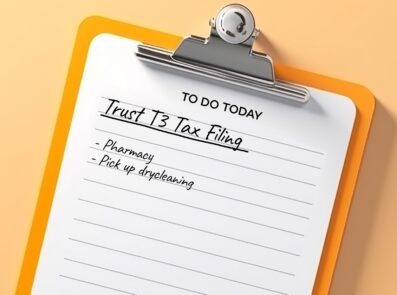BREAKING: Relief for Taxpayers as CRA Cancels Bare Trust Filing Requirements for 2023.
CRA announced on March 28, 2024, that Bare Trusts will not be required to file a return in in 2023. Their news release stated:
The news release states “in recognition that the new reporting requirements for bare trusts have had an unintended impact on Canadians, the Canada Revenue Agency (CRA) will not require bare trusts to file a T3 Income Tax and Information Return (T3 return), including Schedule 15 (Beneficial Ownership Information of a Trust), for the 2023 tax year, unless the CRA makes a direct request for these filings.”
For more information, please view the announcement from the government.
Original articles published February 7, 2024.
The government has introduced new reporting requirements for bare trusts that are expected to have a significant impact on a large number of trusts that have not had to file in the past.
How do you know if you are part of a bare trust arrangement? Here a few common examples that could fall under the new reporting rules:
- Have you set up a corporation to hold the title of real estate?
- Have you opened a bank account for your child or grandchild?
- Are you holding assets in trust for your child or grandchild?
- Have you added your children on legal title of your property or accounts for estate planning purposes?
If you’ve answered “yes” to at least one of these questions, you could be subject to the new trust reporting requirements and be required to file a T3 Trust Income Tax and Information Return for 2023.
New Reporting Requirements
For the calendar year ending on December 31, 2023 and onwards, bare trusts are required to file an annual T3 return with CRA. This is a new reporting rule and not a change to the income tax treatment of bare trusts. While bare trusts should not have any tax owing to the government, a return must still be filed to avoid penalties for non-compliance of up to $2,500.
For additional information, please read New Reporting Requirements for Trusts.
What is a Bare Trust?
The term “Bare Trust” is not defined in the Income Tax Act. A bare trust is a legal arrangement in which one party (the trustee) can reasonably be considered to act as agent for a beneficiary when the trustee has no significant powers or responsibilities, the trustee can take no action without instruction from that beneficiary, and the trustee’s only function is to hold legal title to the property. In other words, the beneficiary is the true owner of the assets held in the trust, and the trustee has no discretion in how the assets are managed or distributed.
The determination must be made on a case-by-case basis, taking into consideration the specific facts of the arrangement. As there is no requirement for such arrangements to be in writing, this adds to the uncertainty of such determination.
However, common examples of bare trusts that would be caught by these new rules include:
- Nominee corporations;
- Parents holding shares of a private corporation for minor children; and,
- In trust accounts for bank, investment accounts etc.
Common Exemptions
Registered education savings plans (RESP), registered retirement savings plan (RRSP), tax-free savings account (TFSA), as well as bank accounts holding less than $50,000 in cash, are some of the common exemptions from filing a T3 Return under the new rules.
However, the less than $50,000 exemption wouldn’t typically apply to traditional trusts that typically hold shares of a private company, or bare trusts that hold legal title to real estate. It is mainly meant for accounts that are held “in trust for” other people, such as for children or other beneficiaries, and only hold cash, savings deposits, government debt obligations or listed securities throughout the year. This is a common practice done through financial institutions in order to simplify estate administration where parents would typically hold funds in an account for a child, where the account would be listed under PARENT NAME in trust for CHILD NAME.
For more exemptions, please read New Reporting Requirements for Trusts.
Not Sure If These New Rules Apply to Your Arrangement?
As some bare trust holders may be uncertain about the new requirements, the CRA is adopting an education-first approach to compliance and providing proactive relief by waiving the penalty for the 2023 tax year in situations where the T3 Return and Schedule 15 are filed after April 2, 2024; this is expected to be a one-time exception for the 2023 year.
Please contact your GGFL advisor if you would like to discuss these rules further and determine if you are subject to these new reporting requirements.







